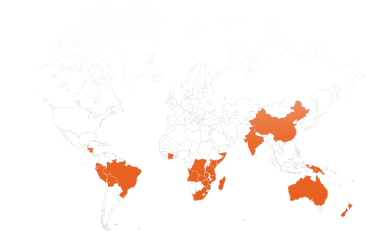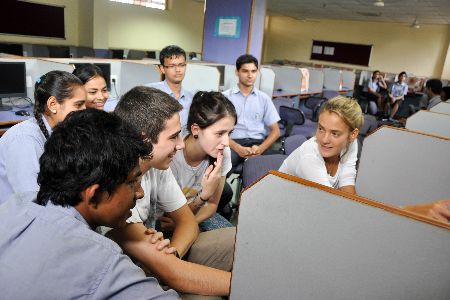Imagine this. You’re traveling to the tropics of Central America for a wonderful, full-immersion study abroad experience, equipped with a homestay and courses taught at the local university (but definitely not in English). You are familiar with the language and have taken numerous courses and practiced your heart out. Then you get off the plane and you think to yourself, how am I ever going to survive?
When I stepped off the plane in Mexico and met my fellow American travelers and director, I doubted my own ability to succeed in my studies. I’ll be honest; the first couple weeks were difficult. I didn’t understand what full immersion truly was and I wasn’t forming any bonds with the other Americans, but luckily I had a great homestay family and program director and refused to listen to the voice in the back of my head telling me to give up and go home, that the language barrier was too much. So how did I overcome this challenge and pressing fear that I wouldn’t fit in or learn enough of the language? How could I experience the culture?
The solution: get out of your comfort zone and interact with the locals.
Mingle.
Don’t let the fear of failure take you out of the moment that could result in great success. Taking classes at a local university while in Mexico was probably the most rewarding aspect of my college education. Fortunately, I was able to take coursework with the same group of students at the university. All my courses were taught in Spanish, which could be a little difficult at times. But luckily, I was able to see my classmates around campus multiple times a week. So, seeing a familiar face, or 20, was quite comforting. Interacting with them was a wonderful way to form friendships, and there’s no better way to get an insider’s view on the local dialect and best places to explore!
Prefer living with a Local.
Living with a homestay family is also a great resource. Not only can you practice your foreign language skills, you can practice them without judgment. My homestay mom was amazing and extremely patient. I messed up word orders, verbs, grammar, and basically anything imaginable. Luckily, she knew some English too, so if I were unsure of how to say something, she would walk me through it. Our daily interactions helped build my confidence.
Use local Resources.
Taking public transportation and walking is also a great way to understand where you’re staying. Nothing is better than knowing how you can get around the city. And hey, if you get lost, there’s usually someone who is willing to help steer you back in the right direction. The best advice I can give is if you’re unsure of where you are, have a specific and centralized location that you can ask directions to. The city center, for me, was a great meet up place. Self-guided walking tours were one of my favorite things to do: map out areas of interest, like parks, museums, cafes, or historical monuments, and take a weekend afternoon to explore them and get a lot of local sightseeing in! There’s so many hidden gems that tourists don’t normally see on these adventures. I recommend doing a little research and orchestrate a tour full of foods and dishes that are famous to the region and/or country that you’ll be in. Plus, it’s a great way to scope out some great shopping.
For me, open-air markets and supermarkets were one of the most intimidating yet rewarding places to go. Here you can find local fruits, vegetables and prepared delicacies, as well as interact with individuals who know bits and pieces of Spanish because it’s their second language. Sometimes it can be like a game of charades, where non-verbal communication has more impact than a spoken language.
Explore. Explore. Explore!
Last but not least, excursions to famous archaeological or cultural sites, whether they’re only for the day or an extended trip, are great resources to help understand the history and everyday life of the country you’ll be in. While I was in Mexico, my study abroad group had quite a few day excursions to archaeological sites on the Yucatan peninsula. Cultural excursions, like visiting a rural community for volunteer services or celebrating/taking part in traditions or festivities, especially during the holidays, can help you be more aware and broaden your horizon. Find out what local holidays or festivities that will occur during your time abroad before you go, and jump on the chance to take part in the celebrations!
If you feel like you are out of your comfort zone, and have gotten into something way over your head, just stop and think about why you chose to go abroad in the first place. Sometimes it takes a little while to adjust to something new, but if you stay and persevere, it will be worth it in the end!!
If you are contemplating a study abroad summer or semester as part of your degree, Kaya advisors can assist in making recommendations as we offer Study Abroad in Asia and Latin America. So feel free to contact us to discuss!



Recent comments